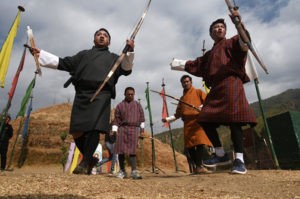– Joaquim Magalhães de Castro
Prior to an archery session, competitors are advised not to spend the night with their wives to achieve a higher level of concentration, and teams often resort to astrologers (armed with puppets symbolizing archers) who can cast “evil eyes” to opponents. They are also the ones who determine where the competition will take place. The women prepare their best delicacies and ensure a continuous presence of butter and tea. It is still for them (as tradition dictates) to encourage their husbands with strong symbolic chants, when it is not gestures and humorous insults. There is a Bhutanese saying: “Archery is to men as songs and dances are to women.” Rival competing archers engage in veritable verbal battles, displaying over the same unsuspected intellectual abilities. They exalt the quality of their own arrows, give advice and mutual encouragement, and demean their opponents by resorting to literary expressions of various shades, the so-called “kha hangar.” In fact, archery is more than a sport. It is a form of exorcism. One of the players tells me: “When I play, all my sins and bad deeds disappear.” I ask him: “Is that a way to cleanse the soul, is that it?” “No”, he says, “if we play, our bad luck, the demons that take hold of us, will go away.”
Throughout Bhutan’s history, bow and arrow have been important tools for providing livelihoods in the highlands, whether in war or hunting, and have always been present in the myths and legends of Bhutan, as evidenced by the images of deities we see depicted on the walls of monasteries and hermitages displaying bows and arrows – must-have items throughout the Bhutanese religious ceremony or ritual, and present in shrines dedicated to local deities, where arrows are left there as offerings. Archery was once the prime means of defense of the population at the time of the Tibetan invasions or in times of internal crisis, when militias were created among the retinues of the local lords under the command of a dapon, that is, “chief of the arrow.” The title continued to be used among military cadres after the establishment of the Bhutanese monarchy in 1907. Transmitted from generation to generation, archery is still the favorite sporting activity of the king of Bhutan today.


 Follow
Follow


